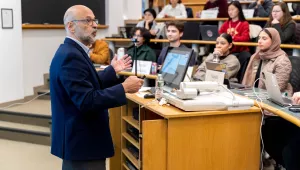Europeans awoke on Thursday morning to news that President Donald Trump had announced the suspension of “all travel from Europe to the United States.” Blaming the European Union (EU) for failing “to take the same precautions and restrict travel from China,” Trump suggested “a large number of new [coronavirus] clusters in the United States were seeded by travelers from Europe.” Yet he added the restrictions would not apply to the United Kingdom (U.K.). Some speculated this was a favor for his friend, Prime Minister Boris Johnson. Brexiteer Nigel Farage was quick to praise Trump for treating Britain “as an independent country.” Others noted that countries hosting Trump golf courses were exempt from the ban. Press reports suggest the administration’s decision-making process was chaotic.
The Department of Homeland Security quickly clarified that the restrictions applied to the EU’s Schengen Area: 26 countries, both inside and outside the EU, that have abolished border controls between them. The U.K. — along with Ireland, Cyprus, Bulgaria, and Romania — are not members of Schengen. Beyond Trump’s suggestion that the U.K. “has got very strong borders and they are doing a very good job,” his administration has failed to explain the differentiated approach. Britain has a higher number of affected citizens — including its health minister — than some Schengen members. (At time of publication, there are 609 cases and have been 10 deaths in the U.K.) It is also taking a much less aggressive approach to containing the virus than its neighbors. Is Britain actually a lower risk, especially with its measured response?
Two days before Trump’s Oval Office address, Johnson spoke to his electorate. The country was still in the “contain” phase, with the government’s advice largely limited to hand-washing. Although critics argued he should follow other European governments in moving to the “delay” phase, Johnson was averse to closing schools, shuttering Parliament, or holding soccer matches in empty stadiums. He cited scientific evidence about how the virus spreads and people respond, arguing that early restrictions could lead to frustrated disobedience at the moment of greatest concern.
The government introduced financial measures to address the economic impact. The Bank of England announced an emergency cut in interest rates, reducing them (from 0.75% to 0.25%) to the lowest level in history. The finance minister unveiled the government’s new budget, which included a $38 billion fiscal stimulus to provide welfare and business support, sick-pay changes, and local assistance.
On Thursday, Johnson announced a move to the “delay” phase. He warned the British public that “many more families are going to lose loved ones before their time.” He advised anyone feeling unwell to stay home, people over 70 not to take cruises, and schools not to bring children on trips abroad. However, he did not close schools or ban large gatherings. In contrast, the Scottish government took a separate decision to prohibit events with over 500 people, seeking to preserve resources for emergency responders. National soccer leagues suspended all matches for the coming weeks after several players and coaches displayed symptoms. And the Irish government closed all schools, universities, and childcare facilities on Thursday. (Similar measures were announced in France, Belgium, Spain, Portugal, Germany, and hard-hit Italy.) Dublin’s decision prompted debate in Northern Ireland, which is part of the U.K. but shares a border with the Republic, over the necessity of an all-island response.
The British government is relying on scientific advice, particularly from Sir Patrick Vallance, England’s chief scientific adviser, and Chris Whitty, England’s chief medical officer. They have defended the government’s decision not to introduce social distancing, arguing the country is at a different stage than its continental neighbors. As the virus is not expected to peak in the U.K. for 10 to 14 weeks, they argue that introducing drastic measures too soon could lead to less vigilance later. Professor Whitty warned that people could become “fatigued” by repeated self-quarantine, closed schools could limit the availability of health workers with kids, and sports fans could still risk contact by gathering in pubs in lieu of stadiums. Sir Patrick explained the government was seeking to create “herd immunity” by building up resistance within the population, suggesting an ideal scenario would involve 60% of the public becoming affected to help everyone be “a bit protected.”
Critics are charging that the government is doing too little, too late. One health expert called the response “pathetic,” suggesting ministers were “behaving like 19th-century colonialists playing a five-day game of cricket.” The editor of The Lancet, a renowned medical journal, accused Johnson of “playing roulette” with the public’s health and making a “major error.” Johnson’s former colleagues have also been critical. Jeremy Hunt, the former health secretary, described the lack of action as “surprising and concerning.” Rory Stewart, the former international development secretary who is running as an independent in the London mayoral race, attacked the government’s “half-hearted response” and said schools should have been closed weeks ago. Opposition parties met on Friday with health ministers, reportedly raising concerns about the government’s over emphasis on behavioral science and failure to explain its different approach.
At a time of widespread polarization, even science is becoming subject to debate. This dispute is reminiscent of discussions about Huawei, as British intelligence experts remain divided over the American assessment that allowing the Chinese tech firm to access 5G networks is risky. Unlike political matters that could be subject to interpretation, COVID-19 will create an objective reality in the coming weeks that will clearly show who is right: the British government’s scientific advisors, who question the utility of early social distancing and rely on sophisticated models regarding the infection rate, or critics pressuring the government to follow the example of other afflicted countries. The answer could come too late.
Sloat, Amanda. “Is Trump Right that Britain is Handling the Coronavirus Well?.” The Brookings Institution, March 13, 2020
The full text of this publication is available via The Brookings Institution.





